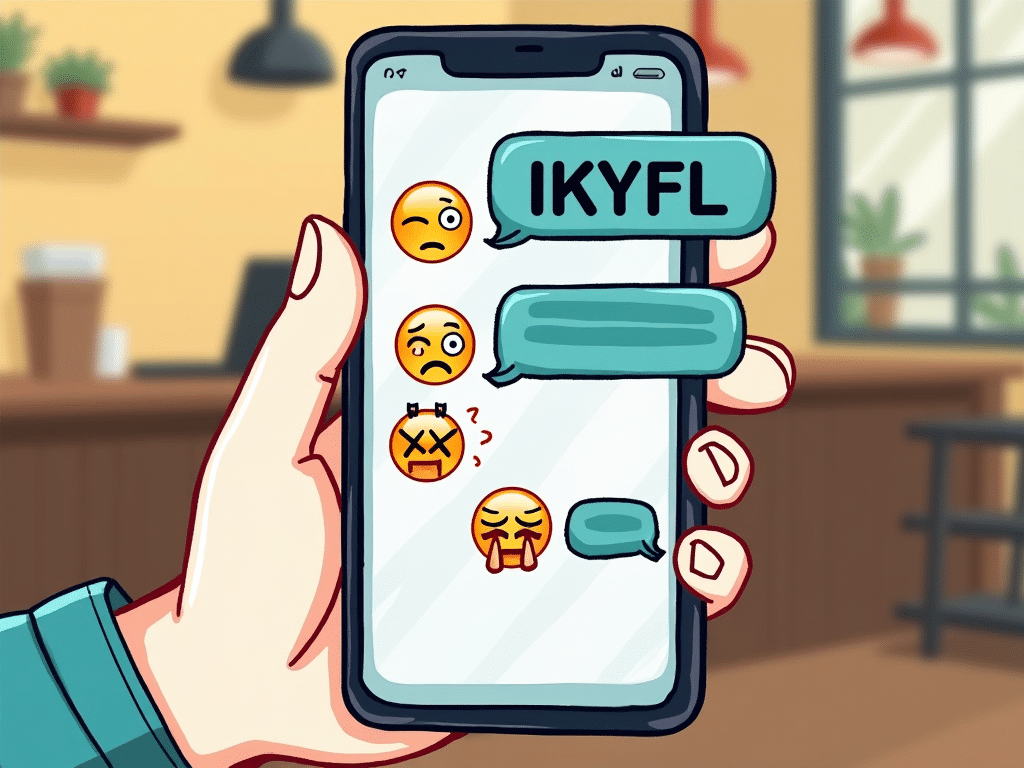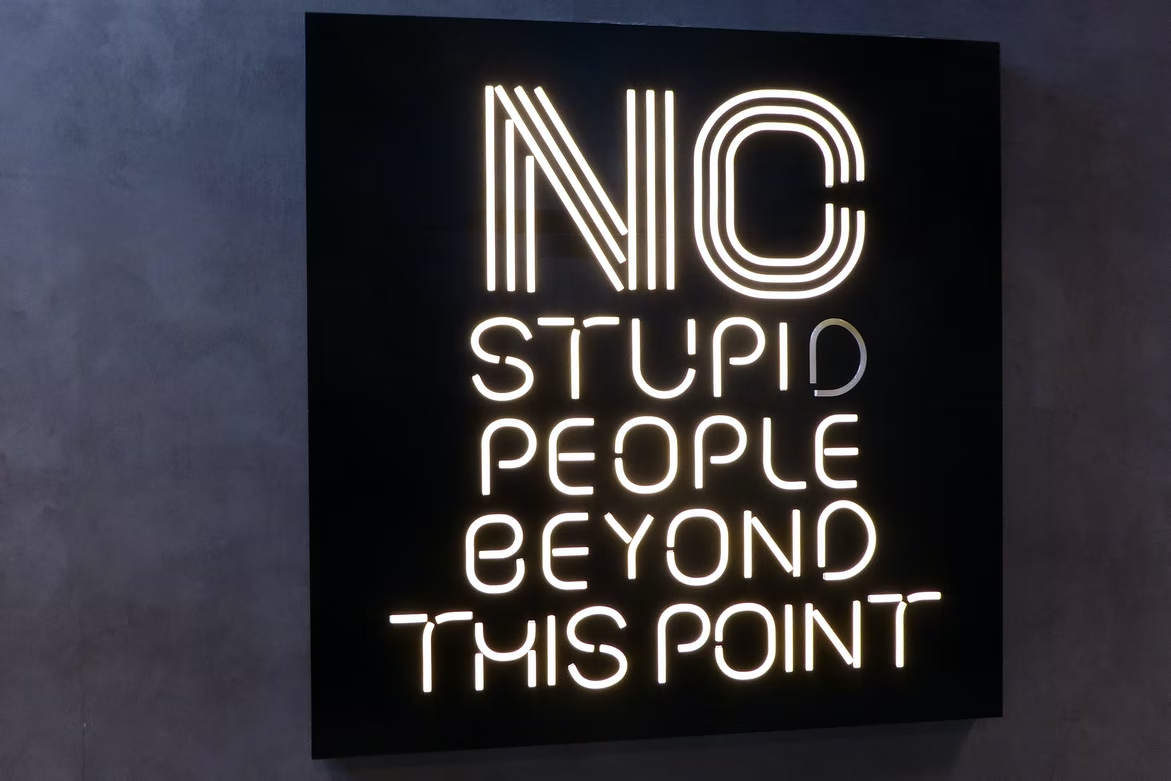In the fast-evolving landscape of digital communication, new words and phrases emerge almost daily, shaping how we interact online. Among these, acronyms and initialisms have become incredibly prevalent, often leaving those not in the know scratching their heads. One such term that has gained significant traction, particularly across social media platforms and messaging apps, is "ikyfl." Understanding the ikyfl meaning is crucial for anyone looking to navigate the nuances of modern internet slang, as it carries specific connotations and usage guidelines.
This guide aims to demystify "ikyfl," exploring its origins, various interpretations, appropriate contexts for its use, and the broader implications it holds for digital etiquette. Whether you're a seasoned internet user or just trying to keep up with the latest linguistic trends, grasping the full scope of this popular phrase will undoubtedly enhance your online communication skills and help you avoid potential missteps. Join us as we unpack the layers of "ikyfl" and shed light on its place in our ever-expanding digital lexicon.
Table of Contents
- What Exactly Does IKYFL Mean?
- The Dual Interpretations of IKYFL: Beyond Disbelief
- Why IKYFL Became So Popular: The Rise of Slang
- Where and When to Use IKYFL: Context is Key
- The "Not Safe For Work" Aspect of IKYFL
- IKYFL in the Broader Landscape of Internet Slang
- Navigating Digital Etiquette: When to Use IKYFL (and When Not To)
- The Evolution of Language: What IKYFL Tells Us
What Exactly Does IKYFL Mean?
At its core, "ikyfl" is an acronym that has found its home in the informal corners of the internet. When you encounter "ikyfl" in a text, a chat, or a social media comment, it's almost always used to convey a strong sense of disbelief or surprise. The most common and widely accepted ikyfl meaning is "I know you're f***ing lying." This interpretation immediately highlights its informal, often expletive-laden nature, making it unsuitable for formal or professional environments. It's a quick, punchy way to express that what someone has just said or done seems utterly absurd, incredible, or blatantly untrue. Imagine a friend telling you they just won the lottery, and your immediate, visceral reaction is one of skepticism; "ikyfl" perfectly encapsulates that feeling in a concise, digital format.
This phrase serves as a verbal (or rather, textual) eye-roll, a digital shake of the head. It's not just about simple disagreement; it's about a level of incredulity that borders on calling out a falsehood directly, albeit in a casual, often playful manner among peers. The power of "ikyfl" lies in its ability to convey a strong emotional reaction—shock, disbelief, skepticism—without needing to type out a lengthy explanation. This efficiency is precisely why such slang terms thrive in fast-paced online conversations where brevity is often prized.
The Dual Interpretations of IKYFL: Beyond Disbelief
While "I know you're f***ing lying" is the predominant interpretation and the one you'll most frequently encounter, the beauty and occasional confusion of internet slang lie in its fluidity. As with many abbreviations, "ikyfl" can sometimes have a secondary, less common meaning: "I know you feel like." This alternative ikyfl meaning offers a stark contrast to the first, shifting from an expression of disbelief to one of empathy or understanding. For instance, if someone is venting about a frustrating situation, a response of "ikyfl" could potentially mean "I know you feel like [doing something drastic or feeling overwhelmed]."
However, it is crucial to emphasize that this empathetic interpretation is far less common and context is absolutely key. The vast majority of times "ikyfl" is used, it will be in the context of expressing disbelief or skepticism. Relying on the "I know you feel like" interpretation without very clear contextual clues can lead to significant miscommunication. The "Data Kalimat" provided clearly states that "Ikyfl is a social media slang term that can either stand for 'i know you f***** lying' or 'i know you feel like,' according to abbreviations." This highlights the potential for dual meanings, but real-world usage heavily favors the former. Therefore, when you see "ikyfl," your first assumption should almost always lean towards the "lying" interpretation, unless the surrounding conversation explicitly points to an empathetic context.
Why IKYFL Became So Popular: The Rise of Slang
The proliferation of terms like "ikyfl" isn't accidental; it's a natural evolution of language in the digital age. The internet, particularly social media platforms and instant messaging apps, has created unique communication environments that prioritize speed, conciseness, and emotional expression. Typing out "I can't believe what you're saying, that sounds completely untrue" takes time and space. "Ikyfl" delivers the same sentiment instantly, with fewer keystrokes. This efficiency is a major driver behind the popularity of acronyms and initialisms.
Furthermore, these terms often serve as markers of in-group communication. Using "ikyfl" signals that you are familiar with current internet culture and slang, fostering a sense of belonging among those who understand it. It's a form of linguistic shorthand that builds camaraderie and identifies shared cultural knowledge. The informal nature of online interactions also encourages the adoption of more casual, often expletive-laced, language that might be frowned upon in face-to-face conversations or formal writing. The rapid sharing of memes, viral videos, and trending topics further accelerates the spread of such slang, embedding terms like "ikyfl" into the collective digital consciousness almost overnight. This dynamic environment ensures that the ikyfl meaning, once established, can spread globally in a matter of days.
Where and When to Use IKYFL: Context is Key
Understanding the ikyfl meaning is one thing; knowing when and where to deploy it effectively is another. As highlighted earlier, "ikyfl" is almost exclusively reserved for informal contexts. Its inherent informality and the presence of an implied expletive mean it has no place in professional or formal communication. Think of it as a casual interjection among friends, not a phrase you'd use in an email to your boss or a client.
Informal Settings: Texts and DMs
The primary habitat for "ikyfl" is personal text messages and direct messages (DMs). Here, among friends, family members, or close acquaintances, the relaxed atmosphere allows for the use of such candid and often playful language. If a friend tells you a wild story about their weekend, and you find it hard to believe, a quick "ikyfl" can convey your skepticism without needing further explanation. It's concise, expressive, and understood within that trusted circle. For example:
- Friend A: "Dude, I just saw a squirrel wearing a tiny hat."
- Friend B: "ikyfl"
In this scenario, Friend B isn't genuinely accusing Friend A of lying in a malicious way; rather, they're expressing playful disbelief at the absurdity of the claim. This casual back-and-forth is where "ikyfl" truly shines.
Public Forums and Social Media
Beyond one-on-one chats, "ikyfl" is also prevalent on social media platforms like X (formerly Twitter), Instagram, TikTok, and various online forums. On these platforms, where comments and replies are often brief and reactive, "ikyfl" serves as a quick way to respond to posts that seem exaggerated, unbelievable, or outright false. For instance, if someone posts a highly improbable claim or a picture that looks heavily doctored, users might flood the comments with "ikyfl" to collectively express their skepticism. However, even in these public, informal spaces, one should exercise a degree of caution, as not everyone in the audience might appreciate or understand the term, or its implied expletive.
The "Not Safe For Work" Aspect of IKYFL
One of the most critical aspects of understanding the ikyfl meaning is recognizing its "Not Safe For Work" (NSFW) nature. The "f***ing" component, even when abbreviated or implied, carries a strong expletive. This makes "ikyfl" unsuitable for use in professional environments, around children, or in any context where polite or formal language is expected. Ignoring this can lead to misunderstandings, offense, or even professional repercussions.
Language and Age Appropriateness
The explicit nature of "ikyfl" means it should be avoided when communicating with or around children and tweens. While younger generations are often the quickest to adopt new slang, parental guidance and educational settings typically discourage the use of profanity. Introducing or normalizing such terms to impressionable minds can be counterproductive to teaching appropriate communication. Similarly, if you're interacting in online spaces frequented by a diverse age range, it's generally best to err on the side of caution and opt for more universally acceptable expressions of disbelief, such as "No way!" or "Are you serious?"
Professional vs. Casual Communication
In the workplace, whether in physical offices or remote settings, clear and respectful communication is paramount. Using "ikyfl" in a professional email, a team chat, or during a virtual meeting is highly unprofessional and can be perceived as disrespectful or flippant. Even in casual conversations with colleagues, it's wise to gauge the workplace culture before deploying such slang. Most professional environments maintain a certain level of decorum, and slang that implies profanity typically falls outside those boundaries. The simple rule of thumb is: if you wouldn't say "I know you're f***ing lying" out loud in that specific setting, then you shouldn't type "ikyfl" either.
IKYFL in the Broader Landscape of Internet Slang
"Ikyfl" is just one star in the vast constellation of internet slang that has emerged and continues to evolve. Terms like "LOL" (laughing out loud), "BRB" (be right back), "FOMO" (fear of missing out), "IMO" (in my opinion), and "TL;DR" (too long; didn't read) have become ubiquitous, forming a new dialect of digital communication. What makes "ikyfl" particularly interesting is its direct emotional punch and its implicit use of profanity, placing it alongside other more aggressive or emphatic slang terms. This category of slang often includes terms that convey strong reactions, such as "SMH" (shaking my head) or "WTF" (what the f***).
The rapid adoption and widespread understanding of these terms underscore a fundamental shift in how language functions in the digital age. Communication is becoming more compressed, more visual (with emojis and GIFs), and more immediate. Slang like "ikyfl" serves as an efficient tool for expressing complex emotions or reactions with minimal effort. It reflects a desire for authenticity and directness in online interactions, even if that directness sometimes comes with a linguistic edge. Understanding the ikyfl meaning, therefore, isn't just about knowing an abbreviation; it's about recognizing a broader trend in how we communicate and connect in the 21st century.
Navigating Digital Etiquette: When to Use IKYFL (and When Not To)
The digital world, much like the real world, operates with its own set of unwritten rules and etiquette. Knowing the ikyfl meaning is only half the battle; applying it with discernment is the mark of a truly savvy digital communicator. As we've explored, context is king. Using "ikyfl" effectively means understanding your audience, the platform you're on, and the overall tone of the conversation.
Here’s a quick guide to help you decide:
- Do use it:
- In private chats with close friends who also use similar slang.
- When expressing playful disbelief or shock at an absurd but harmless claim.
- On personal social media posts where your audience is primarily peers and informal language is common.
- Do NOT use it:
- In any professional communication (emails, work chats, presentations).
- When talking to or around children, parents, or anyone who might be offended by profanity.
- In formal online communities, academic discussions, or news comments sections.
- If you are unsure of the recipient's familiarity with internet slang or their tolerance for expletives.
- When you want to convey genuine empathy or understanding (remember the secondary meaning is rare and often misconstrued).
Ultimately, the goal of communication is to be understood and to foster connection. While "ikyfl" can be a powerful tool for expressing specific emotions quickly, its misuse can lead to confusion, offense, or a perceived lack of professionalism. A little thought before you type can go a long way in ensuring your message is received as intended.
The Evolution of Language: What IKYFL Tells Us
The emergence and widespread adoption of terms like "ikyfl" offer fascinating insights into the dynamic nature of language itself. Language is not static; it's a living, breathing entity that constantly adapts to the needs and environments of its speakers. The internet has provided an unprecedented accelerator for this process, creating new forms of expression and new rules of engagement. The ikyfl meaning, alongside countless other digital acronyms, exemplifies how communities create their own linguistic shortcuts to enhance efficiency and express identity.
This phenomenon also highlights the ongoing tension between formality and informality. As more of our lives move online, the lines between our personal and professional personas can blur. Slang terms like "ikyfl" serve as a reminder that different contexts demand different linguistic approaches. Understanding and respecting these distinctions is vital for effective communication in an increasingly interconnected world. The rapid spread and acceptance of "ikyfl" also demonstrate the power of collective adoption; once a term gains enough traction, its meaning becomes solidified within a community, even if it defies traditional grammatical rules or includes implied profanity. It's a testament to how quickly language can evolve when driven by the collective creativity and communicative needs of millions of internet users.
Conclusion
In conclusion, "ikyfl" is a ubiquitous piece of modern internet slang, primarily standing for "I know you're f***ing lying." It's a concise and emotionally charged way to express disbelief, skepticism, or surprise in casual digital conversations. While a less common alternative meaning, "I know you feel like," exists, the context almost always points to the former interpretation. Its popularity stems from the internet's demand for brevity and its role in fostering a shared linguistic identity among online communities.
However, understanding the ikyfl meaning is only the first step. Crucially, its implied expletive renders it "Not Safe For Work" and unsuitable for professional settings, interactions with children, or any formal communication. Navigating the digital landscape effectively requires not just knowing what terms mean, but also when and where to use them appropriately. By exercising discernment and respecting digital etiquette, you can leverage such slang to enhance your informal communications while avoiding potential missteps. What are your thoughts on the rapid evolution of internet slang? Share your insights in the comments below, or explore our other articles on digital communication trends!



